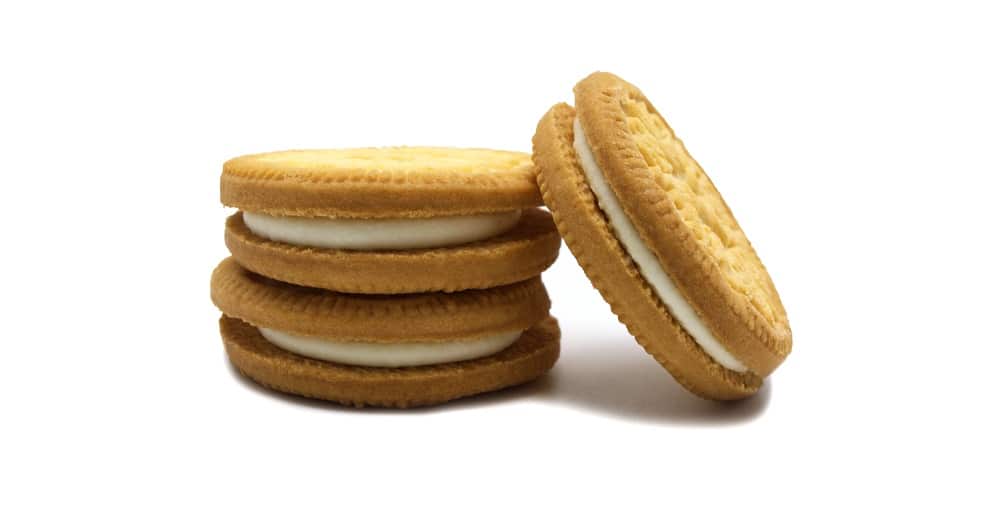A distinct variety of Oreos, Golden Oreos are characterized by having vanilla cookies sandwich the vanilla creme center instead of the traditional chocolate cookies. Produced by Nabisco, the same company that also produces Ritz Crackers, Fig Newtons, and Chips Ahoy, Golden Oreos first debuted back in 2004. Given that Golden Oreos are a flavor of the popular cookie sandwich brand, it is important for people to determine if Golden Oreos are vegan or not.
Since the ingredients list of Golden Oreos does not contain anything that is obviously derived from animals, many vegans should be able to eat Golden Oreos without any worries. However, there might be some vegans that would still prefer to avoid Golden Oreos for certain reasons. Unfortunately, Golden Oreos contains some ingredients that some vegans would rather avoid, namely sugar and natural flavors.
Table of Contents
Are Golden Oreos Vegan?
Golden Oreos can be considered vegan by many members of the community since the product does not contain any obvious animal product or derivative. Aside from blatant animal-derived ingredients, vegans would appreciate that the enriched flour that Golden Oreos contains does not include vitamin D – a typically animal-derived vitamin.

However, there are some vegans that would still choose to avoid Golden Oreos because of a few ingredients. Golden Oreos contain a few ingredients that are considered by some to be gray area ingredients – substances that some vegans are fine with while some vegans are not.
Specifically, Golden Oreos have two of such gray area ingredients: sugar and natural flavors. Many vegans, especially in the US, avoid sugar because some sugar companies process sugar using bone char – an animal product.
On the other hand, some people also choose to avoid products that contain natural flavors because the ingredient can technically contain either animal- or plant-derived products.
Golden Oreos Ingredients List
The list of ingredients of Golden Oreos includes (1): unbleached enriched flour (wheat flour, niacin, reduced iron, thiamine mononitrate [vitamin B1], riboflavin [vitamin B2], folic acid), sugar, canola and/or palm oil, high fructose corn syrup, salt, baking soda, soy lecithin, artificial flavor, natural flavor.
Sugar
Sugar is a common ingredient that can be found in a wide array of food products and beverages. Typically used as a sweetener, it would make sense to assume that sugar is vegan since it is conventionally derived from plant sources such as sugarcanes or sugar beets. However, many vegans are wary of sugar because of the inconspicuous ways it could actually be non-vegan.
Once the sugar is extracted from the plant source of choice, it is already edible and fit for human consumption. However, sugar companies would refine the crude sugar to make it more appealing to the consumers. These additional refinement processes make the sugar whiter and finer. There are many refinement processes involved and they are typically physical or chemical in nature.
Filtration is one of the many processes used in sugar refinement. The sugar juice is passed through a filter to remove the non-sugar components, thus increasing the purity of the sugar product. Different sugar companies can approach filtration in different ways. Some companies use granulated carbon. However, some companies use bone char – the charred skeletal remains of animals (2). Although bone char is a cheap and effective filter, sugar produced using bone char cannot be considered vegan since bone char is an animal product.
The problem with sugar companies using bone char is that filtering sugar with bone char is simply one step of many used in sugar production – details that are not necessarily added on the label or listed on the website. Thus, it can be difficult to determine if a company uses bone char in its sugar production or not.
The problem is further exacerbated when the sugar is found in a food product or beverage because then consumers who would want to know would have to ask the company where they get their sugar from. It can be especially difficult to determine when large food and beverage manufacturers have multiple sources for their sugar demands.
Thus, many vegans tend to avoid sugar just to stay on the safe side. Fortunately, vegans from other parts of the world are less worried about their sugar and bone char because the use of bone char is a practice that is typically more prevalent in the US.
Natural Flavors
Food and beverage products contain a multitude of ingredients. Many serve functional roles that contribute to the overall quality of the product. However, natural flavors strictly aim to impart flavoring for the product. Defined as substances that can be obtained from natural sources, natural flavors are common ingredients that can be found in many food products. Although these substances are indeed natural, vegans are very wary of products that contain natural flavors. The issue stems from the definition of the ingredient. Specifically, the FDA defines natural flavors as (3):
“The essential oil, oleoresin, essence or extractive, protein hydrolysate, distillate, or any product of roasting, heating or enzymolysis, which contains the flavoring constituents derived from a spice, fruit or fruit juice, vegetable or vegetable juice, edible yeast, herb, bark, bud, root, leaf or similar plant material, meat, seafood, poultry, eggs, dairy products, or fermentation products thereof, whose significant function in food is flavoring rather than nutritional.”
FDA.gov
According to the definition given by the FDA, natural flavors do come from natural substances. However, the problem with the definition is that it does not effectively inform vegans since natural flavors can technically contain either plant or animal substances under its umbrella definition. Thus, many vegans consider natural flavors as gray area ingredients because there is no way of determining if the product that contains natural flavors is vegan or not from the label alone – unless the product specifically states in the label that it is certifiably vegan.
References
3. https://www.accessdata.fda.gov/
Featured Image Credit: Stephane shared under Creative Commons Attribution-Share Alike 3.0 Unported license




